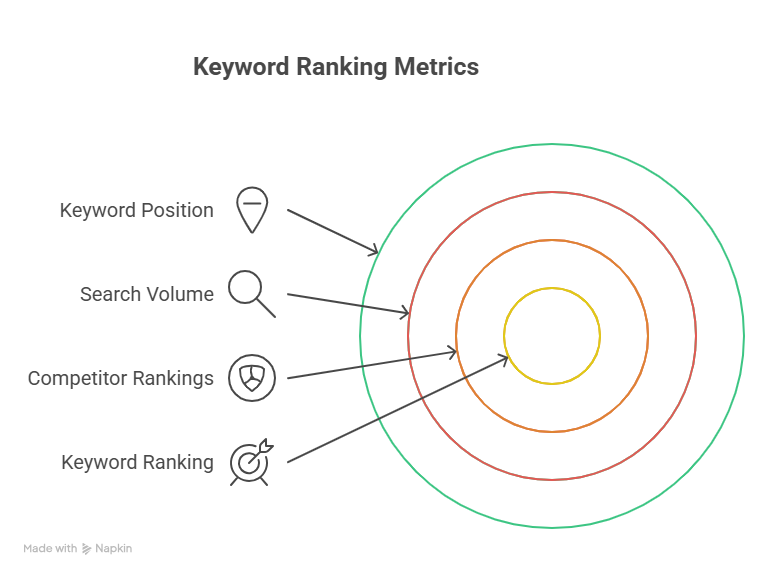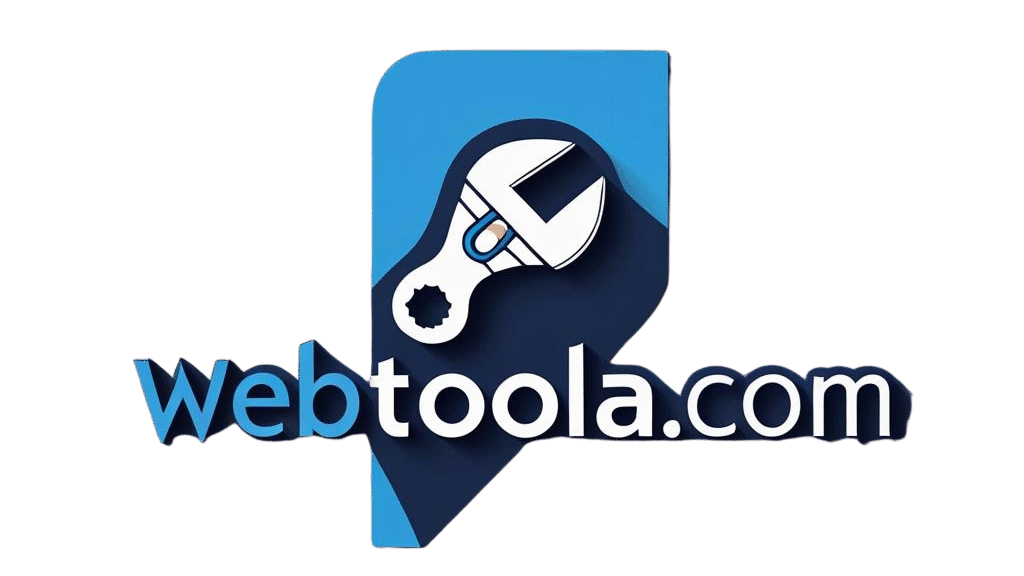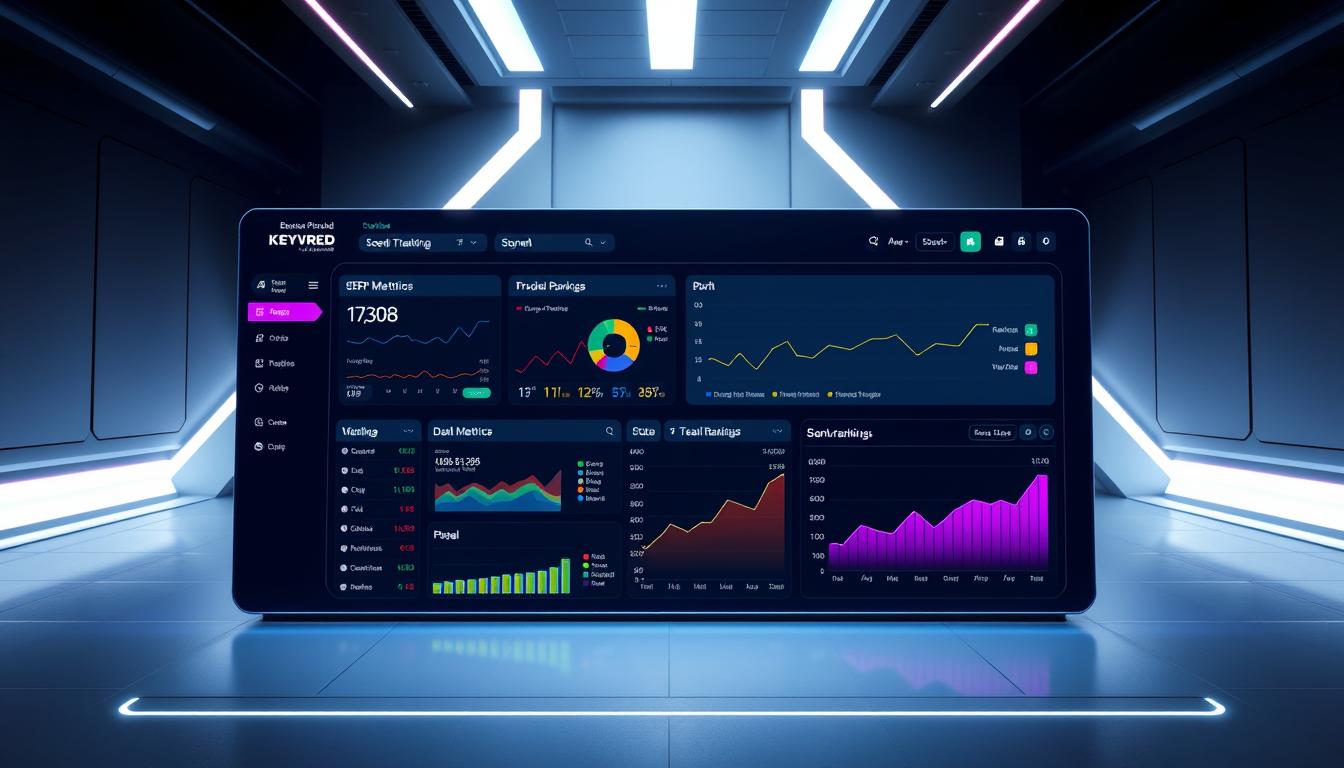In the ever-evolving landscape of digital marketing, understanding your website’s visibility on search engines is crucial. A staggering 75% of users never scroll past the first page of search results, making it imperative for businesses to monitor their keyword rankings closely.
To stay ahead of the competition, leveraging the right serp tracking software can provide invaluable insights into your SEO strategy’s effectiveness. By utilizing a reliable keyword tracking tool, you can identify areas of improvement and adjust your content accordingly.
This article will explore some of the top SERP tools designed to help you track your keyword rankings with ease, ensuring you stay visible and competitive in the digital marketplace.

Why Tracking Search Engine Rankings Matters
In the digital landscape, tracking search engine rankings is vital for optimizing online presence. Search engine ranking software and SEO performance trackers are essential tools that help businesses understand their website’s performance on search engines.
The Impact of Rankings on Website Traffic and Conversions
A higher ranking on search engines like Google directly correlates with increased website traffic and potential conversions. Studies have shown that the top-ranking results on Google receive the majority of clicks, emphasizing the importance of achieving a high rank.
Challenges of Manual Rank Checking
Manually checking search engine rankings can be time-consuming and prone to errors. With the constant changes in search engine algorithms, manual tracking becomes impractical for businesses with multiple keywords to monitor.
Key Metrics to Monitor in Search Results
To effectively track search engine rankings, businesses should monitor key metrics such as keyword positions, search volume, and competitor rankings. Using an SEO performance tracker can simplify this process.
| Metric | Description | Importance |
|---|---|---|
| Keyword Position | The current ranking of a keyword | High |
| Search Volume | The number of searches for a keyword | Medium |
| Competitor Rankings | The rankings of competitors for the same keyword | High |

Best SERP Tracking Software for Optimizing Your SEO Strategy
Optimizing your SEO strategy requires the right tools to track your keyword rankings effectively. With numerous options available, selecting the best SERP tracking software can be challenging. Here, we’ll explore some of the top tools in the industry, including their key features and benefits.
Ahrefs: Comprehensive Keyword Tracking with Position History
Ahrefs is a powerful SEO tool that offers comprehensive keyword tracking with position history. It allows users to monitor their keyword rankings over time, providing valuable insights into their SEO performance. With Ahrefs, you can track keyword rankings across multiple search engines, including Google, Bing, and YouTube.
Ahrefs’ keyword tracking feature is particularly useful for identifying trends and patterns in your SEO data. By analyzing your position history, you can refine your SEO strategy to improve your search engine rankings.
SEMrush: Real-Time Rank Monitoring and Competitor Analysis
SEMrush is another popular SEO tool that offers real-time rank monitoring and competitor analysis. It provides detailed insights into your keyword rankings, allowing you to adjust your SEO strategy accordingly. SEMrush also enables you to monitor your competitors’ rankings, giving you a competitive edge in the SEO landscape.
With SEMrush, you can track your keyword rankings across multiple devices and locations, ensuring that you have a comprehensive understanding of your SEO performance.
Moz Pro: Local and National Rank Tracking with Custom Reports
Moz Pro is a robust SEO tool that offers local and national rank tracking with custom reports. It allows users to monitor their keyword rankings in specific geographic locations, making it ideal for businesses with a local focus. Moz Pro also provides custom reporting features, enabling you to tailor your SEO data to your specific needs.
With Moz Pro, you can track your keyword rankings over time, identifying areas for improvement and optimizing your SEO strategy accordingly.
Serpstat: Budget-Friendly SERP Analysis and Rank Monitoring
Serpstat is a budget-friendly SEO tool that offers SERP analysis and rank monitoring. It provides detailed insights into your keyword rankings, allowing you to refine your SEO strategy. Serpstat is particularly useful for small businesses or individuals on a budget, offering a range of SEO features at an affordable price.
With Serpstat, you can monitor your keyword rankings across multiple search engines, including Google and Bing.
Google Search Console: Essential Free Tool for Performance Tracking
Google Search Console is a free tool offered by Google that provides essential insights into your website’s performance. It allows users to monitor their keyword rankings and impressions, giving you a better understanding of your SEO performance. Google Search Console is a must-have tool for any SEO professional, providing valuable data to inform your SEO strategy.
With Google Search Console, you can track your website’s performance in search results, identifying areas for improvement and optimizing your SEO strategy accordingly.
Conclusion: Choosing the Right SERP Tracking Tool for Your Needs
Selecting the ideal SERP tracking tool is crucial for optimizing your SEO strategy and improving your website’s visibility. By leveraging website ranking analytics, you can gain valuable insights into your website’s performance and make data-driven decisions.
When choosing a SERP tracking tool, consider your specific needs, such as the ability to monitor competitor rank tracking or track local and national rankings. Tools like Ahrefs, SEMrush, and Moz Pro offer comprehensive features that cater to various SEO requirements.
Ultimately, the right SERP tracking tool will help you refine your SEO strategy, enhance your online presence, and drive more traffic to your website. By understanding your website’s ranking dynamics and staying ahead of the competition, you can achieve your online marketing goals.
FAQ
What is SERP tracking software, and how does it help with SEO?
SERP tracking software is a tool used to monitor and analyze the position of a website in search engine results pages (SERPs) for specific keywords. It helps with SEO by providing insights into keyword rankings, competitor performance, and organic search tracking, enabling data-driven decisions to optimize online presence.
How often should I check my keyword rankings?
The frequency of checking keyword rankings depends on your SEO strategy and goals. Using a rank monitoring tool, you can track your rankings daily, weekly, or monthly, depending on how often your target keywords change and how quickly you need to respond to these changes.
Can I track my competitors’ keyword rankings?
Yes, many search engine ranking software and SEO performance trackers, such as SEMrush and Ahrefs, offer competitor rank tracking features. These tools allow you to monitor your competitors’ keyword rankings, analyze their strengths and weaknesses, and adjust your SEO strategy accordingly.
What are the key metrics to monitor in search results?
Key metrics to monitor in search results include keyword rankings, organic traffic, click-through rates (CTRs), and conversions. Using a keyword tracking tool or SEO performance tracker, you can gain insights into these metrics and understand how your website is performing in search engines.
Are there free tools available for tracking keyword rankings?
Yes, Google Search Console is a free tool that provides insights into your website’s performance in search results, including keyword rankings and organic traffic. While it has limitations compared to paid SEO tools, it is an essential resource for understanding your website’s visibility in search engines.
How do I choose the right SERP tracking tool for my needs?
To choose the right SERP tracking tool, consider your SEO goals, budget, and the features you need. Look for tools that offer the metrics and insights you require, such as keyword tracking, competitor analysis, and website ranking analytics. You may also want to consider factors like ease of use, customer support, and scalability.

